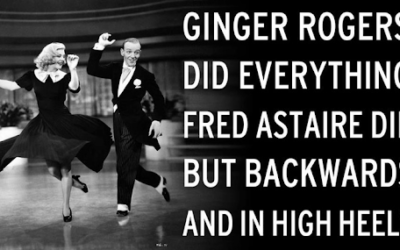Does it seem like the perpetual issue of “work-life balance” is getting old and worn out? Have we given up on it or is it just time to evolve to a different way of thinking about managing our energy as we accomplish things at work and life our life? – InPower Editors
When The Atlantic published Why Women Still Can’t Have it All by Anne-Marie Slaughter in 2012, a great debate ensued about whether the dream of worklife balance was even possible. Dr. Slaughter argued that it wasn’t and gave us all something to think about after decades of seeking an elusive, and for many impossible, balance between our work and our “life.”
Now, two years later when the subject of worklife balance comes up, most people I talk to groan and laugh because the idea of “balance” just seems absurd in a 24/7 world. However, no one I’ve ever talked to has stopped hoping that our career and non-career efforts could coexist more comfortably. We haven’t given up. We’re just looking for a new way to think about work, life and the mashup of both of them that is our life.
[Tweet “No one I’ve ever talked to has stopped hoping that our career and non-career efforts could coexist more comfortably. via @danaTheus”]
I’m noticing this tension more now that summer is here and both my boys are home from college. Four people vying for three cars (one of which is perpetually in the shop), multiple work schedules and ongoing attempts to coordinate watching a family HBO series is starting to take its toll from my by-comparison sedate empty nest. It’s reminding me of summers schlepping them to camp in between work calls and meetings many years ago.
Recently I experimented and tried to track how many hours I spent “at life” and how many I spent “at work.” After two hours I gave up for two reasons. First, life is choppy and that’s ok. For example, while writing this “work” article, I fielded one “personal” phone call from my husband coordinating dinner and transportation around my work event calendar, and I responded to one emergency work email about a software program I have that is malfunctioning on my personal computer’s browser. Both were pleasant distractions while writing. Sure, you should have good habits like putting the cell phone to sleep while eating dinner with loved ones more often than not, or tell the kids not to call when you’re in a meeting… But let’s face it, it’s often a good thing that you can Google the answer to a heated debate over chicken pot pie or field a request for pickup from the soccer field instead of the baseball field so you know when the leave the meeting.
Second and more importantly, in an “always on” world it’s not about the time, but the energy that work and life take from us. Neither the call nor the email really sapped my energy or took time away from writing the article (I still met my deadline). So what does it matter? What does matter is when worrying about work in the middle of the night keeps me from sleeping and makes me drag my tush around the next day. The energy suck of worry while trying to fall asleep doesn’t technically count as “work” but it sure impacts my “life!” This explains how it’s possible for many people to report feeling more stress at home than at work!
[Tweet “When I manage my energy instead of my time, I find that I always feel balanced, no matter what I’m actually doing.” via @DanaTheus”]
The fact is that we need to update the idea of “balance”, which implies some kind of distinction and “time logging” in every moment of a 24/7 world. What counts to me more than the time I allocate to work or life, is the energy that I spend. When I manage my energy instead of my time, I find that I always feel balanced, no matter what I’m actually doing.
Although it takes a little practice, there are strategies we can all use to manage our energy even when we feel we have little control over our time. The first step is to start noticing where your energy goes when you do things. Is your energy going up or down? Do you even notice? Most of us don’t. We just know we’re exhausted at the end of the day and we don’t stop to notice what it was that was sapping our energy so we could interrupt the pattern.
What saps your energy? What gives it back? What strategies do you use to manage your energy budget and stay “balanced?”
Join this month’s discussion on WorkLife Boundaries and download the free coaching worksheet to help you manage your energy more naturally and fluidly in the InPower Coffee Break community. (Register or Login and put our Free-to-All Coaching Call on July 25th on your calendar now!)
Take charge of your career development to get the job that supports your work and your life. Check out the tools and resources in the InPower Coaching Career Center.






